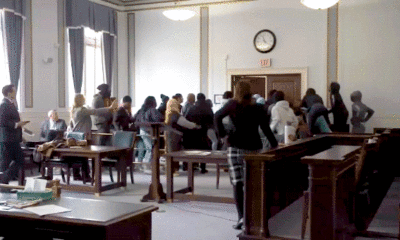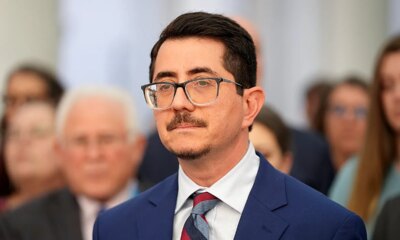Yoon Suk Yeol vowed that as South Korean president he would “rebuild this great nation” into one “that truly belongs to the people” when he delivered his inauguration speech in May 2022.
Instead, his presidency has been marked by mounting unpopularity and political dysfunction, culminating on Tuesday in his declaration of martial law in the country for the first time in more than four decades.
Yoon has faced serious challenges from the start of his term, entering power with a low approval rating and a parliament dominated by the opposition.
The 63-year-old former prosecutor, who played major roles in the successful prosecutions of former presidents Park Geun-hye and Lee Myung-bak, had never held a political role before announcing his presidential candidacy in 2021.
In 2019, he was appointed as prosecutor-general by his predecessor as president, liberal Moon Jae-in — but their relationship soured after Yoon launched an investigation into Moon’s justice minister, significantly raising Yoon’s public profile. After his resignation in March 2021, Yoon secured the presidential nomination of the conservative People Power party.
In the election the following year he eked out a victory against his liberal rival by just 0.73 per cent — the narrowest margin in any South Korean presidential contest.
Yoon had an early taste of the challenge he would face from the opposition-controlled parliament when he struggled to gain approval for his preferred cabinet nominees, four of whom were forced to withdraw amid allegations of impropriety.
The difficulties continued as Yoon tried to pass legislation. As of January 2024, only 29 per cent of bills submitted to parliament by his government had been passed.
Yoon responded by wielding the presidential veto power to strike down opposition-sponsored legislation, vetoing more laws than any of his predecessors since the end of military rule in 1987.
Early in his term, he made a point of informally taking questions from journalists as he arrived at work. But his relationship with the media soured as he targeted critical reporting, with police and prosecutors repeatedly deployed against supposed publishers of “fake news”.
Another public relations setback came when Yoon announced a plan to relocate his office from the historic “Blue House” palace in central Seoul to a defence ministry complex. Yoon hoped that his more down-to-earth work setting would make him seem more in touch with the general public, but he faced an outcry over the cost of implementing the plan.
Other fights have come over critical policy areas, including education — Yoon was forced to drop a plan to make children start school a year earlier — and health, with doctors undertaking a long-running strike over pay and conditions.
His unpopularity was underscored by parliamentary elections this April, which delivered another large majority for the opposition Democratic party.
Opposition lawmakers have since been pushing for an investigation into Yoon and his wife over allegations, which Yoon has strongly denied, of improper dealings with a polling agency owner.
Yoon has sometimes found a warmer reception overseas — notably during a state visit to Washington in April last year, when he delighted President Joe Biden with a rendition of the 1970s song American Pie. Yoon also became the first South Korean president to attend a meeting of Nato and extended significant aid to Ukraine, as he deepened military and security collaboration with the US and Japan.
This drew criticism from the opposition, who accused him of antagonising China, the country’s most important trading partner.
In contrast with his predecessor Moon, who favoured dialogue with North Korea, Yoon has taken a harder line towards Pyongyang, which has responded with more missile tests during his rule.
As the parliamentary resistance has continued, Yoon has become increasingly frustrated — particularly over the opposition’s attempts to impeach prominent members of his administration and its refusal to pass his proposed annual budget. The opposition has countered with a smaller package, which Yoon said would mean unacceptable cuts to areas including disaster preparedness and child care support.
“The legislative dictatorship of the Democratic party . . . uses even the budget as a means of political struggle,” Yoon said on Tuesday in his speech announcing martial law.
Hours later he said he intended to lift the “emergency” measure after lawmakers voted it down in parliament — leaving his own position more uncertain amid one of the most serious constitutional crises in South Korea’s modern history.





































